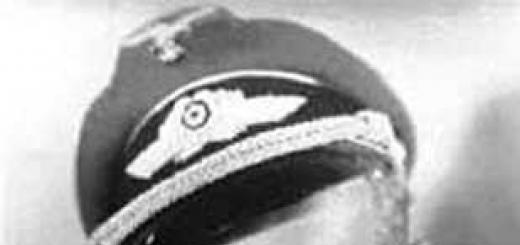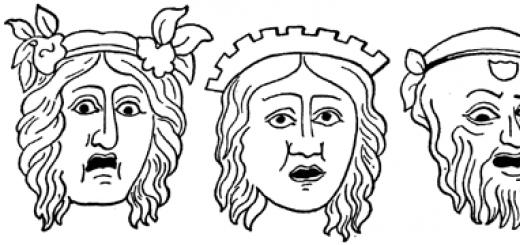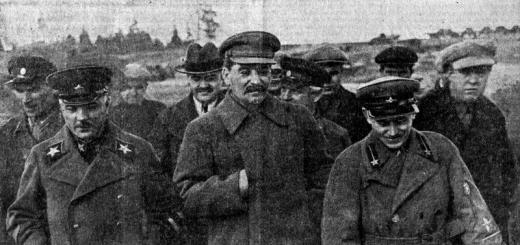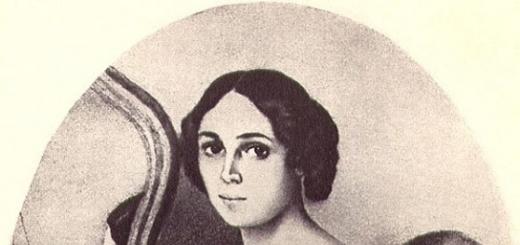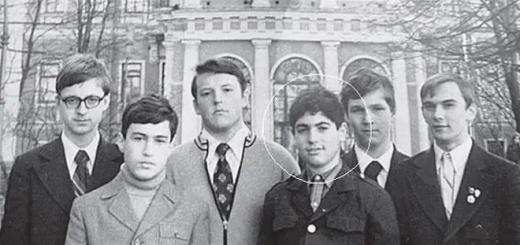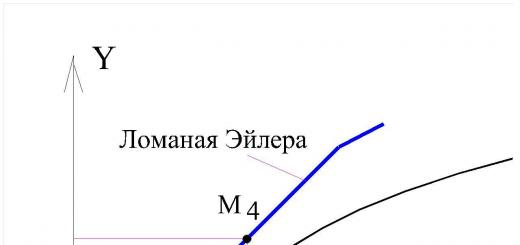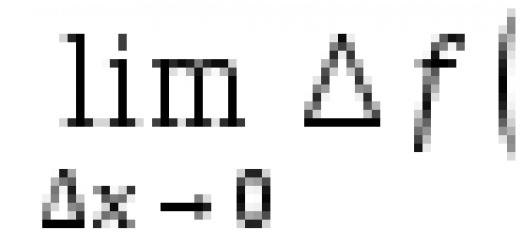Comparative characteristics of Ostap and Andria based on Gogol's story Taras Bulba
The theme of N.V. Gogol’s story “Taras Bulba” is not just a depiction of the life of the Ukrainian Cossacks in ancient times, not just an excursion into the history of the struggle of the best sons of the Fatherland for its independence - the writer showed us the soul of the people, the formation of their national identity. That’s why the author takes us to the Zaporozhye Sich - the heart of the Ukrainian Cossacks. That’s why she admires, together with us, the readers, her free, brave knights, and admires the unshakable and fair, albeit harsh, laws of the Sich. “This is the nest from which all those proud and strong, like lions, fly out. This is where the will and Cossacks spread throughout Ukraine,” writes N.V. Gogol with pride. The author shows us precisely the young Cossacks, the sons of the glorious Colonel Taras Bulba, so that in their faces we can see young Ukraine, its strength and aspirations.
The Zaporozhye Sich was a guiding star for them. Even Ostap, who was languishing with boredom in the school and buried his primer in the ground four times, began to study well as soon as his father threatened to send an ignorant student to a monastery and said that he would never see Zaporozhye like his own ears. Ostap became one of the best students. Andriy lived not so much in dreams of the future, but in the present, walked, fell in love. Today he was a student, but tomorrow has not yet come.
The characters of the brothers emerge even during their studies at the bursa. Open and straightforward, Ostap endures punishment for Bursak pranks, but does not betray his comrades. Andriy knows how to get away with it, never exposing his back to the rod, although he often leads some of the students’ raids on the market. He seems more developed, more sensitive, more romantic than his older brother, not noticing either beautiful girls, or flowering gardens - nothing in the world, all of whose thoughts are about friendly parties and the military prowess of the Cossacks. Andriy seems at first better than Ostap, more soulful and humane, capable of more subtle, tender feelings and experiences.
When the brothers arrive home from Bursa, we see that the eldest will not allow anyone to laugh at him and is even ready to fight with his fists with his own father, and the younger one does not seem to hear the ridicule. The harsh and even rude Ostap, leaving for the Sich, feels sorry for his own mother, thinks about his quickly flashed childhood, and the “romantic” Andriy seemed to cut himself off from everything, forgot about everything. He seems to be a man without a “root”, without a core. The brothers' behavior in the Sich, military exercises, horse riding and shooting are assessed by the most demanding judge - their father Taras. He is proud of his sons, their courage, dexterity, leadership among young people, but he also notices the difference in their behavior. Andriy “was completely immersed in the charming music of bullets and swords.” He does not know what it means to think about, or calculate, or measure in advance his own and others’ strengths; that is, he loves battle for the sake of battle itself, sees only himself on the battlefield, wants to entertain himself, to show himself.
Ostap, first of all, “in an instant could measure out the entire danger and the entire state of affairs, and could immediately find a way to evade it in order to then more accurately overcome it.” Taras understands that the eldest son will make a “good colonel.” It is precisely then, in order to test his sons in battle, in order to raise them in the best traditions of the Cossacks, that he demands to go on a campaign. The campaign and siege of Dubno will truly become an important milestone in the life and military path of the brothers. When Ataman Bearded dies, the Uman people will unanimously elect Ostap as Ataman Ataman, even though he is the youngest among them. The Cossack will not make excuses, because he will understand: his time has come. He will immediately prove himself to be a good organizer and a reasonable commander. Many episodes of the last battle are connected specifically with Ostap. Almost “eight people at once” can even defeat him.
Andriy, as soon as he sees his beloved beautiful Pole, not only commits a humane act - he gives bread for the girl’s mother, who is dying of hunger, he betrays those closest to him, his dearest: “What is my father, comrades, and homeland to me! My homeland is you! I will sell, give away, and destroy everything I have for such a fatherland!” A person without a sense of homeland, without loyalty to friendship is lonely before death. No one will give him the strength to withstand punishment, no one will stand next to him to share his final torment and support him. We see the frightened, pale Andriy, standing in front of his father for the last time - and we do not see father and son. Taras kills his son with his own hand, because this is the only thing, in his opinion, that he can do to avoid shame. He will even deny his dead son the last honors - burial at the hands of his comrades. Bulba will tear the traitor out of her heart. Having abandoned the dead man at the edge of the forest, Taras will gallop to his comrades, who call him - the chieftain - father, because they are his children “by heart, not by blood.”
But Taras will make his way to Ostap, surrounded by enemies, to the last, until he himself falls unconscious. In spite of everything, he will go to the very thick of it - to the enemy’s capital Warsaw, offering any money for the release of his son, and when he cannot do anything, he will not abandon him at the last minute, he will come to the square where the Cossacks will be executed. Even in terrible grief, Taras has something to be proud of for his son. In the enemy camp, Ostap feels like a part of the Ukrainian Cossacks, a commander, who should be an example for his comrades. Taras understands that he has raised a wonderful son, a true comrade, dear not only by blood, but also by soul. They deserve each other. Ostap's last words on the square do not show the hero's weakness at all, but a strong man who, for a moment, before his death, asked for friendly support. Father's "I hear you!" will sound like that greeting from the Sich, from Ukraine, the word of the highest friendship and love.
The author fully shares this respect and love for the hero, even the “wake for Ostap” therefore does not look too cruel, because we understand the father and share his grief. And the author, like Taras, no longer remembers Andria, because he is not worth it. I, the reader, like Ostap not only as a warrior, ataman of the Umanians, but also simply as a man of strong character who knows how to love his mother, father, comrades, native land - everything that makes up the Motherland. What a person protects not only out of a sense of duty, but also at the behest of his heart.
Lesson type: speech development lesson
The purpose of the lesson: preparation for writing a home essay on the topic: “Two lives - two destinies.”
Lesson objectives:
- teach comparative characteristics of literary heroes;
- develop analytical work skills;
- cultivate moral qualities (patriotism, camaraderie)
Equipment: texts of N.V. Gogol’s story “Taras Bulba” for analysis, multimedia projector.
During the classes
Teacher: Today’s lesson is the final one in the study of N.V. Gogol’s historical story “Taras Bulba”. We are preparing for a homework essay “Two Lives, Two Fates”, in which you will compare the characters and try to answer the question: Why did N.V. Gogol show the sons of Taras Bulba with such different destinies? (slide1, 2) (Annex 1)
Teacher: What does it mean to compare, compare?
Children: Find similarities and differences. (slide 3)
Teacher: What do you think there are more similarities or differences in the sons of Taras Bulba? We will discuss your answers based on the text of the work.
Years of study.(slide 4)
Teacher: How did each of the brothers show themselves during their studies? (slide 5) Give examples.
Children (answers are entered in the table):
Homecoming.(slide 6)
Teacher: After a long study, Taras’s sons are at home. How did their parents greet them? What hopes do they have for their sons? (slide 7)
| Ready to get into a fight with my father. | Resists his father's ridicule. |
(for the mother, the sons are the same, she loves both of them, but the younger one is softer, more gentle. Ostap will not let anyone offend him, not even his father; Taras sees and understands this.)
Z Aporozhye Sich.(slide 9)
Teacher: What are Ostap and Andriy thinking about on the way to Sich? (slide 10)
Teacher: What do they dream about? (slide 11)
Teacher: What impression did the Zaporozhye Sich make on them? (slide 12)
Teacher: How did you perform in Zaporozhye?
(slide 13) World of feelings.
Teacher: Compare the sensory world of the heroes. Which of them worries more, sees, notices, admires?
Children: Andriy is softer, gentle, inclined to see beauty.
Teacher: To whom and what are their feelings directed?
| Love for the Motherland, mother, comrades. | Love for a beautiful lady. |
Teacher: Can we call Ostap a patriot? What can you say about Andria?
Teacher: Do you consider it a betrayal to love a girl of a different nationality?
Children: No, love knows no boundaries. Love is not a crime.
Teacher: At what point does Andriy’s moral decline occur and he turns into a traitor?
(slide 16,17) (teacher reading fragment)
Last minutes.(slide 18)
Teacher: How did Taras accept the news of his son’s betrayal?
Teacher: Was Andriy ready to give up his beloved?
Teacher: What qualities did Ostap show in the last minutes of his life?
Conclusion (pivot table) (slide 21) (Appendix 2)
Teacher: Why does N.V. Gogol compare Ostap Bulba and Andria? (Ostap and Andriy were born in the same family, raised by the same parents, studied together at the bursa, but the brothers are different in their characters and actions)
Teacher: What is the main difference between the two brothers? (slide 22) (Ostap is faithful to the Cossacks, comradeship, the Motherland, he is a worthy son of his father, his people; Andriy is faithful to his feelings, the personal is higher than the public for him.
Reminiscence.
Teacher: What works of literature does Andriy’s betrayal echo?
Children: A.S. Pushkin “The Station Warden”, “The Parable of the Prodigal Son”.
Teacher: Compare the endings of these works.
Children: The prodigal son repented and was forgiven by his father; Dunyasha realized her guilt, but came too late to her father; Andriy remained faithful to love, renounced his Fatherland - he died at the hands of his father.
Teacher: The story was written 170 years ago, but the issue of patriotism is relevant in our time, and therefore works of fiction continue to live in the works of our contemporaries. ( Appendix 3 , http://www.youtube.com/watch?v=MjAnxNpG3tk)
D\Z. Write an essay “Two lives - two destinies.” Answer the question: Why did N.V. Gogol show the sons of Taras Bulba with such different destinies? Express your own attitude to the topic.
4 Years of study Ostap. Artist E. Kibrik Andriy. Artist E. Kibrik. 1945



7 "Taras Bulba". Chapter 1. “Well, let’s fight!” - said Taras Bulba. Rolling up my sleeves, I’ll see what kind of person you are in your fist!” Artist A. Gerasimov “Taras Bulba”. Chapter 1. “Well, great, son, let’s have a fight!” Artist A. Gerasimov “Taras Bulba”. Chapter 1. “Look, what a dad!” - the eldest son, Ostap, thought to himself, “the old dog knows everything, and he’s also pretending!” Artist A. Gerasimov. 1952

8 “And you, baby, why are you standing there and giving up your hands?... why aren’t you, son of a dog, beating me?” “Eh, you’re a little bastard...” “... He’ll be a good Cossack!... Good, son!” “... she clung to the bedside of her dear sons...” “she turned into one vision and could not look enough...” “... she sat until dawn and wanted the night to last as long as possible...”


10 "Taras Bulba". Chapter 2. Andriy’s first meeting with a Polish woman. Artist P. Sokolov “Taras Bulba”. Chapter 1. “My sons, my dear sons! what will happen to you? what awaits you? » Artist A. Gerasimov. 1952

11 "Taras Bulba". Chapter 1. “Farewell to childhood, and games, and everything, and everything!” "Artist A. Gerasimov "Taras Bulba". Chapter 2. “Oh, how important it was to turn around!” wow, what a curvaceous figure! "Artist A. Gerasimov "Taras Bulba". Chapter 2. “At the entrance they were deafened by fifty blacksmith hammers striking in twenty-five forges...” Artist A. Gerasimov. 1952





What is my father, comrades and homeland to me! - So if that’s the case, then this is it: I don’t have anyone! Nobody, nobody! Who said that my homeland is Ukraine? Who gave it to me in my homeland? The Fatherland is what our soul seeks, what is dearer to it than anything else. My homeland is you! This is my homeland! And I will carry this fatherland in my heart, I will carry it until it reaches my age, and I will see if one of the Cossacks snatches it from there! And I will sell, give away, and destroy everything that I have for such a fatherland! 16



"Taras Bulba". Chapter 9. Death of Andriy. Artist E. Kibrik “Taras Bulba”. Chapter 6. “Old Taras will tear out a gray tuft of hair from his chuprin and curse the day and hour in which he gave birth to such a son to his shame.” Artist A. Gerasimov “Taras Bulba”. Chapter 9. “I gave birth to you, I will kill you!” Artist A. Gerasimov. 1952

20 "Taras Bulba". Chapter 11. Execution of Ostap. Artist M. Derigus “Taras Bulba”. Chapter 11. Ostap before execution. Artist E. Kibrik “Taras Bulba”. Chapter 11. “Father! where are you? Can you hear? Artist A. Gerasimov. 1952

21 Open, stubborn, persistent, honest, loyal. Introverted, capable, resourceful, cunning, loves to take risks. Ready to get into a fight with my father. Resists his father's ridicule. He accepts thoughts about his mother and the laws of life of the Zaporozhye Sich calmly, in battle he is cool-headed, confident, and able to lead. Thoughts about the lady, he is horrified by the way of life of the Cossacks, enjoys the danger, is ready to take reckless risks. Love for the Motherland, mother, comrades. Sees the beauty of nature, appreciates female beauty. Love for a beautiful lady. Endures all the pains of torture, a heroic death. Killed by his father. The inglorious death of a traitor.

 When compiling the presentation, illustrative materials from the site were used: Lesson in format a
When compiling the presentation, illustrative materials from the site were used: Lesson in format a

To use presentation previews, create a Google account and log in to it: https://accounts.google.com
Slide captions:
Ostap and Andriy Portrait. Portrait characteristics. Literary images of the heroes of the work.
Gerasim is the main character of the story “Mumu.” What does an author need to create the image of a literary hero? What does it create? How to do it? To create an image, the author needs to know:
Means of creating the image of a literary hero hero name portrait appearance clothes Occupation behavior interior Actions We answered the question “What does the author create?”
An artist paints with paints, and a writer draws using means of artistic representation: metaphors, comparisons, personifications, hyperboles, etc. We answered the question: How does the author create an image?
Let’s answer one more question: What is the difference between the terms “portrait” and “portrait characteristic?” We found out that the term “portrait characterization” is a broader concept, which also includes the author’s assessment of the character and behavior of the hero.
Now let's talk about our heroes. Ostap Andriy At the beginning, the author gives a general portrait of the brothers. Why? But here the difference between the brothers is emphasized. How? Are the brothers the same or different? Let's fill out the table
Ostap Andriy Where did you study? How did you study? How did you study? Pranks and pranks? Pranks and pranks? Responsibility for an offense Responsibility for an offense Attitude towards their poor mother Did they make good warriors? Is he capable of betraying his comrades? Is he capable of betraying his comrades?
Why do you think Andriy becomes a traitor? Give arguments in writing: How could we justify it? Can he be justified?
At the beginning of the story there is an indication that Andriy may betray his homeland. Find the Motherland in the text, Mother - know how to defend! Mother What three central words - symbols are present in the story “Taras Bulba”, around which the entire story is built? Motherland LOVE
What character traits of Andria led to betrayal? Do you agree with the statement: “Andriy could only think about himself, and therefore was not able to stand up for the common cause?” Give a complete written answer to this question and receive a grade.
In the next lesson we will talk to you about Taras Bulba, about comradeship, about the modernity of the story.
On the topic: methodological developments, presentations and notes
Presentation for a literature lesson, grade 11, topic "Russian literature of the late 19th - early 20th centuries. Traditions and innovation."
The presentation will help the teacher illustrate a lecture on the topic "Russian literature of the late 19th - early 20th centuries." The material contains main points, photographs....
Literature lesson 9th grade “M.Yu. Lermontov “Hero of Our Time” is the first psychological novel in Russian literature. Complexity of composition.”
The lesson notes can be used when studying the novel "A Hero of Our Time" in grades 9 - 10...
Presentation for a literature lesson, grade 9 "Lermontov's "Hero of Our Time" is the first psychological novel in Russian literature. The complexity of the composition"
Presentation for the lesson...
The sons of Taras Bulba, Ostap and Andriy, are the main characters in N.V. Gogol’s story “Taras Bulba”. Taras Bulba Ostap AndriyN. V. Gogol Two brothers Ostap and Andriy, who grew up and were brought up in the same conditions, are completely opposite personalities.

Ostap Andriy Years of study Ostap. Artist E. Kibrik Andriy..Artist E. Kibrik. 1945

Ostap The Younger Son He studied willingly and had an inventive mind, which allowed him to avoid punishment for participating in the pranks of the students. He is distinguished by his ardent imagination, secrecy, love of solitude, impressionability, and love of female beauty. Andriy Eldest son Brave, stern and did not tolerate insults directed at himself. He is silent, calm, reasonable. Ostap was considered the best comrade, never betrayed, loved war and wild parties.




Both brothers died a terrible death. Andriy was killed by his father for treason and betrayal. Ostap was executed. He died like a hero who endured all the torments and trials. He endured all the hardships of execution. He was helped by his love for his comrades and his homeland. During Ostap’s execution, Taras looked with downcast eyes, but when his son needed support, he shouted: “I hear you!” This is "I hear you!" - boundless love and tenderness for his son, pride, hatred of enemies, threat of revenge. Taras Bulba accepted the death of his dear, beloved sons. The death of a true Cossack and traitor - his son.

